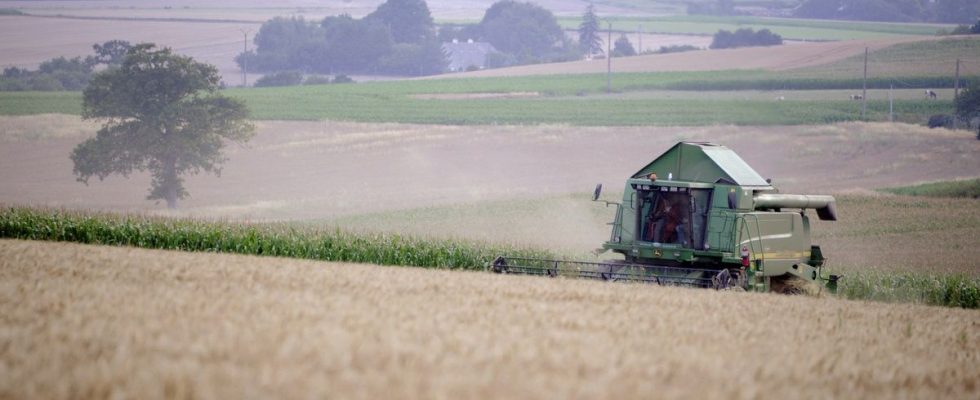While farmers in the south of France are coping with drought and lack of water, those in Normandy and Hauts-de-France have to squeeze through the raindrops to finish the harvest. Last Friday, the second day “without water”, or almost for more than two weeks in this coastal area of “the tip of the Pays de Caux”. The first result is insufficient because the sample of wheat taken is too wet: more than 18% humidity, above the bar set to be able to be exported from Rouen, the leading grain port in Western Europe, to sixty miles away.
On Friday, the three Varin brothers (Guy, Marc and Luc) had 27 hectares of wheat left to harvest, out of the 70 on their farm in Bretteville-du-Grand-Caux (Seine-Maritime). “We hoped to have good weather today to say to ourselves it’s good, we will be able to harvest. And unfortunately a few drops fell just now (…) it’s wheat that can’t leave for the port”, laments Marc Varin, 37, after bringing the sample to a site of the Noriap cooperative all nearby, where quality and moisture content are measured.
The summer harvest thwarted by the rains
If the summer harvest in France as a whole was deemed “satisfactory” by the National Establishment for Agricultural and Seafood Products (FranceAgriMer) and the technical institutes for field crops (cereals and oilseeds), Arvalis and Terres Inovia . That of soft wheat, the cereal for bread, was “partly (…) upset by the rains”.
As of August 7, the soft wheat harvest was 89% complete across France (compared to 94% on average from 2018 to 2022) and only 66% in Normandy (compared to 85%). In Brittany, half of the wheat (51%) was harvested, compared to the usual 84% at the same time.
To be eligible for export, the grain of wheat must not have more than 15.5% humidity. The Varin brothers harvest up to 17% humidity, explains Guy Varin, 41, while his youngest pilots a combine harvester, under an unusually gray August sky. “In normal times we would not have done with such a high rate, but we know that we will lose more”, in quality and in money, “if we wait more”. “It’s a compromise,” he said. To postpone the harvest is to risk seeing the wheat “wither” or germinate, and to sell it at a lower price, as fodder, in order to feed livestock.
Only 200 millimeters of rain in July
“We took almost 200 mm of rain in July”, mainly at the end of the month, when “the wheat was just ripe”, underlines Pierre Delamare, technical sales representative of the Noriap cooperative, who covers an area from Le Havre (Seine-Maritime) to Dunkirk (North). All harvests since that date have produced grains that are “strongly degraded, with some sprouted”, he notes.
Growers take advantage of every thinning. The Varin brothers worked until three o’clock in the morning from Thursday to Friday to harvest 13 hectares of wheat. On Friday, three hectares were finally able to be harvested at the end of the afternoon, before the rain resumed at 7 p.m. The season had however started well, recalls Guy: “As of July 20, we had succeeded in (harvesting) 30 hectares, it is exceptionally early”, ten days more than usual. “We said to ourselves, great, we’ll finish early…”

